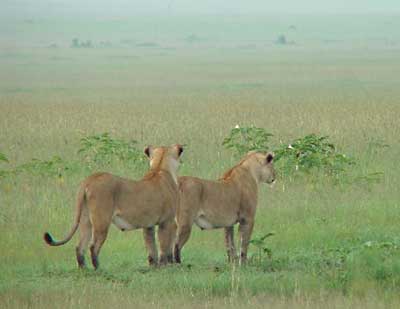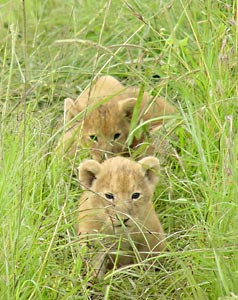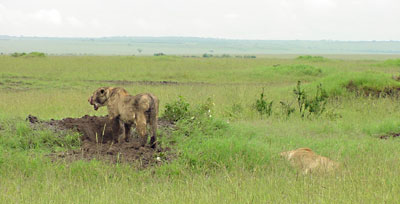 January should be one of the driest months of the year but not so this one. It rained and rained, maybe an unseasonable compensation for the terrible drought which afflicted this country last year |
|
We had friends visiting from Colorado and took them on a safari to the famous Masai Mara game reserve, one of the finest areas for wildlife in East Africa. I have been driving to this place for nearly 40 years but have never seen it so wet as the week we chose to go there. We spent many hours ploughing through deep mud and flooded rivers and finally made it to our camp just before last light. The car was caked with mud and our friends staggered out of it in a state of shock. |
 |
|
The Mara River winds its' way south towards the Tanzania border about 20 miles away. Either side of the river is a flood plain which, normally at this time of year, is dry and easy to negotiate, but not now. The grass came up to an elephant's flanks and the plain was one huge swamp populated mainly by hippos and large herds of elephants. Movement in our vehicle was extremely limited so most days we slithered and slid our way across the plain and climbed to high ground where most animals with any sense and a desire for dry feet had now moved. I have mentioned last year's drought. Although it was a time of incredible hardship for most animals and the local people, some species thrived. Mostly, these were the predators and scavengers. The lions had an easy time. They didn't have to hunt much — most of their meals came from carcasses of drought casualties — so for them, it was a time of plenty and, as is always the case when lion life is a breeze, they multiplied. The only problem was, when the cubs were finally born, the drought was over, the rain had arrived, the grass had grown tall and all the normal prey animals, mindful of how easy a lion can hide in long grass, had decamped for higher ground where it was shorter and lion cover less evident. One morning, we found two lionesses stalking down the airstrip. They looked thin and very intent. A long way off were some gazelles, already alert to the approaching lions. It was obvious from their teats that they were feeding small cubs and were extremely hungry. Apart from those few gazelles, which would have been almost impossible for a lion to catch, the only other animals which would suit their hunting abilities and palates were warthogs and this is what they were looking for. |
|
 |
We watched them for a while and then moved on. Half a mile away, we came to a bush lined stream named "Bila Shaka" which, in Swahili, means "without doubt" so named because for years it has been a favorite hiding place for lions. All tourists want to see the big cats and this has been one place where a sighting has been almost guaranteed. Slowly, we drove amongst the bushes and then, suddenly, saw a tiny cub scramble into the cover of a thicket. We drove close and waited and soon were able to count a total of seven babies, the families of the two lionesses. The cubs were about two weeks old, their eyes still a blue-grey color and their progress, an unsure waddle. Even at this tender age, they were wrestling each other and eliciting lots of "Oohs" and "Aahs" from the female occupants of our safari rig. |
|
The next day was our last and I decided to leave the area via the lionesses
den. We didn't see the cubs but the two mothers stood on an old termite
mound where an anteater had dug a hole and that, in turn, had become
the home of a warthog. Evidently, the lionesses had chased him back
to his underground haven and had then tried to dig him out. One female
was lying exhausted in the grass; the other in a very undignified way,
was digging like a dog, trying to extricate the hog. Both lionesses
were panting and covered with mud. |
|
| This episode was a sobering finale to our safari. Our guests were overflowing with questions as to the future prospects of those two lion families. I had to explain that in normal circumstances, it would be a good average for three cubs in a litter to survive, but that in this case, with prey animals so scarce, it would be unlikely that half those cubs would survive. I tried to temper this with a reminder of how much other animals had suffered in the drought when the lions were riding high at their expense. |  |